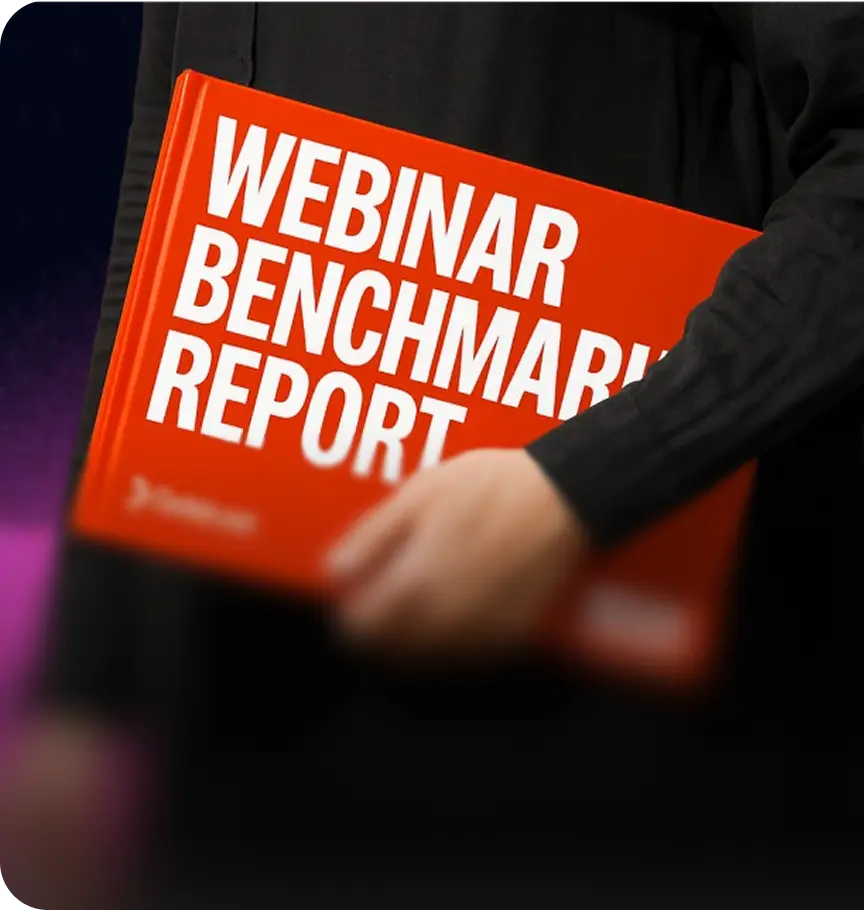MQL Myth-Busting: Field Marketing Insiders on What It Really Takes to Build a Robust Sales Pipeline

Maximize Your Marketing ROI
Join 10,000 other marketers already getting the best tips on running engaging events that boost pipeline and create raving fans.
If you’ve been in the event marketing space for long, you’ll have heard the “MQL is dead” line.
Many marketers are convinced it’s time to say goodbye to ‘old fashioned’ pipeline metrics and move into a more human-focused sales approach, while others still hold a torch for MQLs.
But is it really time to start mourning MQLs? Or do they have a permanent place in field marketers’ playbooks? Or, is it somewhere in between?
In this deep dive into the role of MQLs for revenue marketers, we check in with field marketing experts to find out whether it’s really time to move on (or not), and how to build a robust sales pipeline that earns field marketers the respect they deserve.

MQL Myth-Busting: Here’s what we’ll cover
1. What are MQLs? (And why do some folks think they’re overrated?)
2. Do MQLs still have a place in your pipeline?
- Yes, if you go for quality over quantity
- Yes, but “don’t go shouting to sales”
- Yes, MQLs are gold
- Yes, as long as you’re clear on what MQL actually means
3. Dress to impress: How to use virtual events to boost MQL value
4. There’s life in MQLs yet (as long as you focus on quality)
What are MQLs? (And why do some folks think they’re overrated?)
Before we dive in, let’s take a minute to remind ourselves of the whole MQL story.
MQLs (or Marketing Qualified Leads) are individuals who could be a potential customer but haven’t yet made the leap—they need nurturing before marketing can hand them over to sales, where they’ll become an SQL or Sales Qualified Lead.
Sounds simple. So why are some B2B marketers turning their backs on the good ol’ MQL?
- Too much data: Let’s say you sell a SaaS product to B2B marketing teams. That’s a pretty big customer base. Even if you narrow your audience, you’ll still end up with a ton of MQLs who will simply never be your customers. The outcome? A whole bunch of bad data blocking up your systems.
- Wasted time: As a marketer, it’s your job to nurture leads and turn them into a potential SQL. But with all those MQLs-that’ll-never-be-SQLs knocking around, chances are you’ll waste a ton of time nurturing tire-kickers, when you could be focusing on the accounts that matter.
- Sales wants quality over quantity: Your sales team knows the value of talking to leads who actually want to be customers, and they’re ready for the change.
- MQLs are actually humans: As customer expectations, marketing channels, and business values change and evolve, many companies are shifting towards a more human approach to marketing and sales. It’s time for real conversations with real people.
So, is there still a place for MQLs in your pipeline? And if yes, where should they sit and how should you view them? Let’s get into it.
Do MQLs still have a place in your pipeline?
Yes, if you go for quality over quantity
With over a decade of marketing experience under her belt, Amy Stroup, Marketing Events Manager at Showpad, has had her fair share of working with MQL-heavy pipelines.
For Amy, the MQL debate is all about the balance between quantity vs quality and marketing vs sales.
“Awww, MQLs. Quantity vs quality, or as I like to call it: an intense game of hot potato between sales and marketing,” laughs Amy.
Despite the intense balancing act, she believes if you can get it right, MQLs are still useful.
“You need to have a clear and mutually agreed upon definition of what quality means with your sales team. If you can achieve this alignment, MQLs are great. Heck, sprinkle in well-defined ICPs and intent signals, combined with clear roles around who owns which sales stage, and MQLs are dare I say…valuable,” says Amy.
For Amy, MQLs still have a place—as long as you focus on quality.
“Is the MQL dead? No. Are quantity over quality MQLs dead? I sure hope so,” she says.
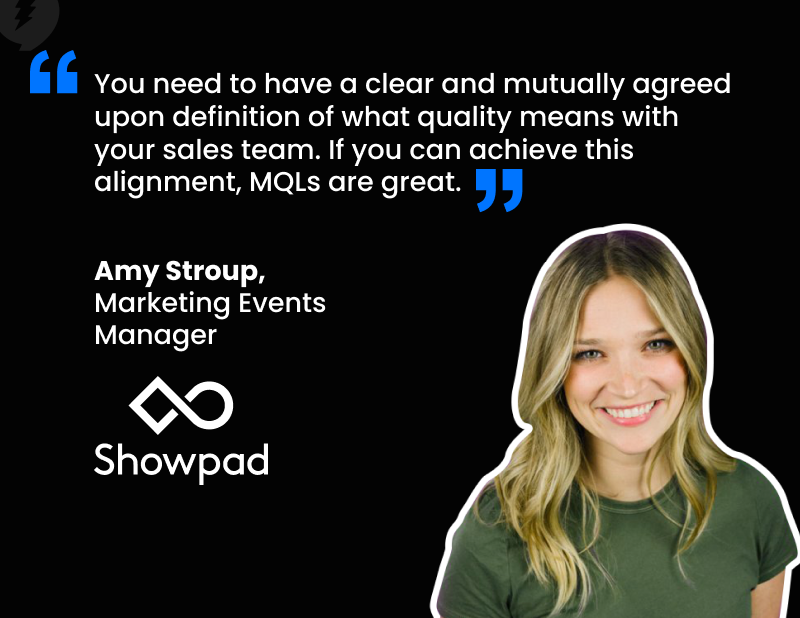
Yes, but “don’t go shouting to sales”
As Director of Account-Based & Field Marketing at Alyce, Nick Bennett knows his way around a great ABM strategy—and he believes MQLs still have a place (as long as you keep it quiet). 🙊
When we asked Nick which KPIs field marketers should track, he was clear: “Pipeline. Period.”
For Nick, MQLs are included in that, but you need to be careful about where you share your info.
“You can look at the MQL—but only within marketing. Don’t go shouting that number to sales. Use it to help with lead scoring and that threshold,” he says.
Here are the other metrics Nick says you should track:
- “Influenced and sourced [pipeline] for sure—and it depends how good your attribution model is and what software you're using.
- You should look at other things like ABM makeup from virtual events because those are your key accounts.
- You should look at conversion as a marketing team from MQL to SQL.
- Also closed-won should be in there even though as a marketer you don’t have as much influence over it.”
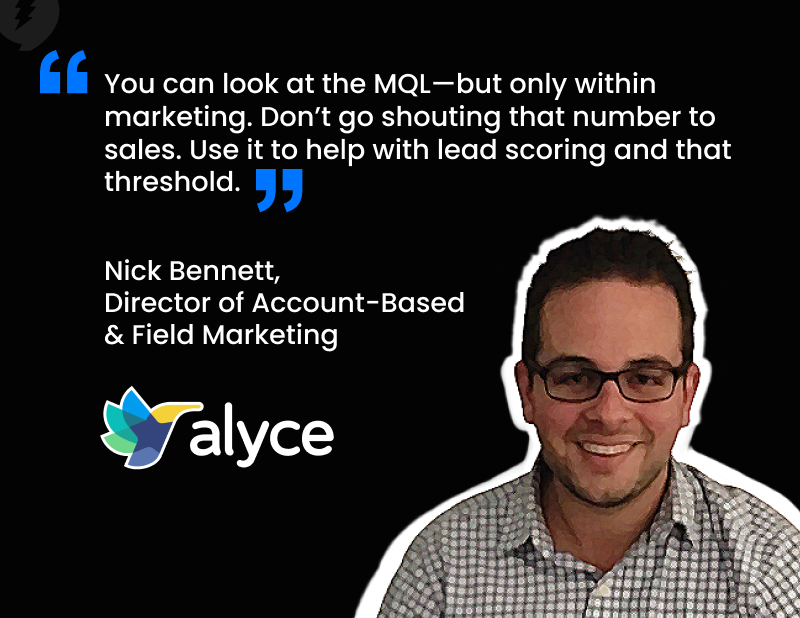
Yes, MQLs are gold
Jonathan Leigh, Demand Marketing Manager at Treasure Data knows good data when he sees it—and that’s why he believes there’s still a place for MQLs in your pipeline.
“A common misconception is that MQLs are an everflowing bag of sand (leads) where it is certain some gold (revenue) resides. To find the gold, the sales development team needs to sift through the sand. The leads that have previously exhibited some intent signals are more often than not left behind after the most immediate opportunities are found. To move onto the next proverbial bucket of sand with some gold,” says Jonathan.
But rather than seeing MQLs as limitless and low-quality, Jonathan wants to see marketers seeing MQLs for what they really are.
“I’d like to see MQL’s seen more as a bucket of gold with some sand, than a bucket of sand with some gold!” he says. “That’s not to say there shouldn’t be discussions about acquiring more enriched sand or enabling the team to process different types of sand more efficiently. But with enterprise buying cycles being so long, sometimes it’s worth making glass with some quality sand.”
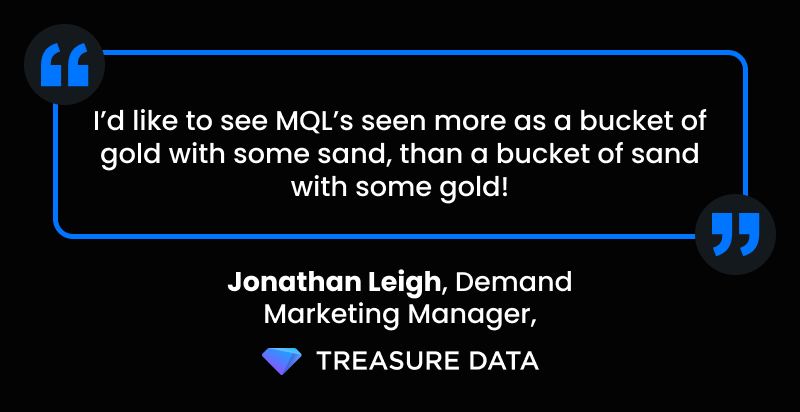
Yes, as long as you’re clear on what MQL actually means
For Allison Stevens, Senior Marketing Manager, Northeast and Canada, at BeyondTrust, the debate is more about terminology than whether MQLs are actually dead or not.
“Some people live and die by MQLs, and others claim they are dead. I think we get caught up in the terminology—because in reality an MQL means something different to everyone,” she explains.
So, how do you get clear on what MQL actually means?
“If you dissect the words ‘Marketing Qualified Lead’, the subjective part is ‘qualified’,” explains Allison, “But what does ‘qualified’ actually mean? Clearly defining what ‘qualified’ means to your company (yes, that means sales too) is the key to success. Too many times you hear ‘marketing is passing fluffy leads’ or ‘these leads are junk’. If a person attends a virtual event, are they an MQL? No. If they download a piece of your content, are they an MQL? No.”
The answer is to focus on the leads that matter.
“For my team, the notion of creating MQLs only covers about a third of our jobs. We focus on creating experiences for people who are already in the pipeline and progressing from mid- to bottom- of the funnel through our events. But for the pipeline generation and more ToF marketing activities, real MQLs are valid. For us, a qualified lead needs to perform a hand raise that says ‘I'd like to speak to my sales rep’,” she says.
For Allison, MQLs aren’t just alive, they’re kicking.
“MQLs are the main metric—you can't measure warm fuzzy feelings that contribute to someone connecting to your brand,” she says.
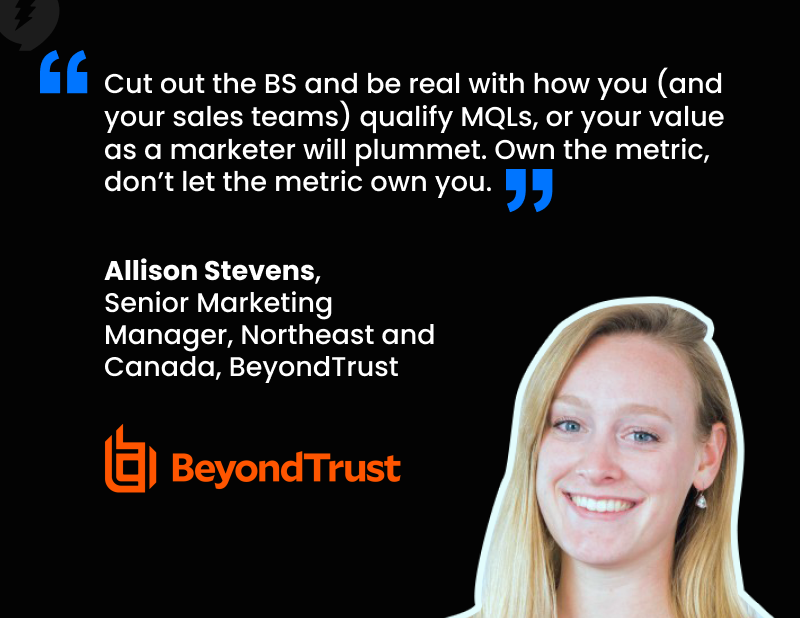
Dress to impress: How to use virtual events to boost MQL value
It’s clear that MQLs still have a place in the hearts of field marketers.
But to boost the quality of your MQLs, there’s work to be done.
That’s exactly where the right kind of virtual event can play a role.
By showcasing your company in the best possible light, positioning your brand as a leader in the field, and shouting “quality” from the (virtual) rooftops, your leads will walk away feeling inspired and ready to convert.
Here’s a quick rundown of how to run a killer virtual event:
- Dress your brand to impress by choosing a virtual event platform that streams like Netflix.
- Work with sales to align your goals throughout the event.
- Build strong relationships with partners, sponsors, and other stakeholders to extend your reach and boost attendee numbers.
- Focus on attendee engagement to really ‘wow’ your MQLs.
- Drill down on your KPIs to prove your worth and earn an all-important seat at the revenue table.

Janna Erickson and the leading field marketing team at Drift know all about walking the walk when it comes to virtual events.
The team selected Goldcast to run their annual RevGrowth events which enabled them to create a beautifully streamlined experience with some super engaging sessions for prospects who fit their ICP.
“We took a lot of the same elements from our in-person events. We stuck to the one stage, the one day, we made sure we had a DJ involved. Plus, we had an all-star line-up including Coca-Cola, Amazon, GoFundMe and the former CMO of Beats by Dre,” says Janna.
Needless to say, it was epic. And better yet? Janna now had the data she needed to prove it.
“One of the main reasons we went to Goldcast was the data grab. A lot of software doesn’t have all those different touchpoints,” says Janna. “These insights are great for sales to build talking points. Instead of just saying, ‘I saw you attended RevGrowth’, they can say, ‘I saw you were doing X during this session, what a great session, I loved this, what did you think?’ It gives them more of a human touch.”
There’s life in MQLs yet (as long as you focus on quality)
No matter which way you cut it, MQLs have been around for a long time. And by the look of it, they’re not going extinct anytime soon.
As long as you prioritize quality over quantity, and only send solid leads over to sales (rather than overload them with weak MQLs), the opportunities MQLs bring still outweigh the drawbacks.

Transform Your Video Marketing with AI
Stay In Touch
Platform
Resources
© 2026 Copyright Goldcast, Inc. All rights reserved.





 Upcoming Events
Upcoming Events Event Series
Event Series On-Demand Events
On-Demand Events